Trump 12
Trump’s 243 measures against Cuba
Compendium of Trump’s measures against Cuba
Translated and edited by Walter Lippmann for CubaNews.
Thanks to Johana Tablada of MINREX for this compilation.
January 20, 2021
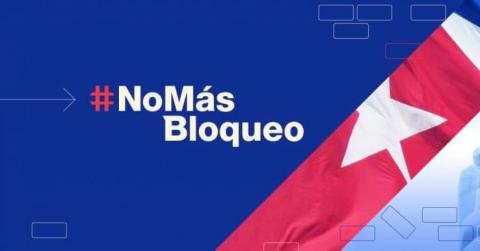 The policy of hostility of Donald Trump’s government against Cuba registered unprecedented measures and actions, which stood out for their systematicity. All spheres of our society and the daily life of citizens suffered the impact of this design, accentuated in the context of the pandemic.
The policy of hostility of Donald Trump’s government against Cuba registered unprecedented measures and actions, which stood out for their systematicity. All spheres of our society and the daily life of citizens suffered the impact of this design, accentuated in the context of the pandemic.
More than 240 measures have been counted. Most of them were actions to tighten the blockade with the aim of economically suffocating the country, subverting the internal order, creating a situation of ungovernability and overthrowing the Revolution.
The emphasis on hindering the main sources of income and hindering our trade relations was notorious in scope.
The main affectations generated by the policy towards Cuba during the Trump administration presented the following behavior:
Title III of the Helms-Burton Act.
The decision to allow lawsuits in U.S. courts under Title III of the Helms-Burton Act was an unprecedented action, after 23 years of successive suspensions of this possibility. This has had an indisputable impact on the prospects of attracting foreign investment, since it constitutes a disincentive that adds to the already existing obstacles due to the regulatory framework of the blockade. So far 28 legal proceedings have been initiated in U.S. courts under the Act.
Travel
The travel sector has been a recurrent target of attack during the Trump administration.
Travel alerts to citizens under the pretext of alleged health incidents were followed by the banning of cruise ship travel, the suspension of the “people-to-people” educational travel subcategory, and the modification of two of the licenses allowing visits by U.S. citizens to Cuba.
The creation of the List of Prohibited Accommodations in Cuba, which included 422 hotels and rental houses, constituted an additional disincentive to travel.
Scheduled and charter flights were cancelled to all parts of the country except Havana, whose frequencies were also limited. The effects of this announcement reached both U.S. citizens and Cuban families.
Remittances
The decision to limit the amount of remittances to US$1,000 per quarter, the suspension of non-family remittances and the prohibition of remittances from third countries through Western Union, imposed greater difficulties on the income of many Cubans.
The impossibility of processing remittances through Fincimex and AIS eliminated the main formal channels for remittances.
Medical cooperation
Within the framework of the campaign to discredit Cuba’s international medical cooperation and a regional scenario favorable to the right, the U.S. promoted the termination of agreements with several countries in the area and increased pressure on multilateral organizations and third countries. In addition to the undeniable human cost of these actions, the economic impact for Cuba has been considerable.
Trade and Business
Regulatory changes issued by the Departments of Commerce and the Treasury dismantled existing provisions and created new coercive instruments. The measure preventing the importation of products from any country containing more than 10% U.S. components was reimposed on Cuba. In a globalized economy, this constitutes a real obstacle to acquiring necessary inputs, regardless of the market of origin.
In the interest of curtailing one of the main exportable items, the importation into the U.S. of rum and tobacco of Cuban origin was banned, an announcement that was combined with rhetoric aimed at discrediting those products.
The creation of the List of Restricted Cuban Entities by the State Department, with which persons subject to U.S. jurisdiction are prohibited from engaging in direct financial transactions, was aimed at hindering foreign trade and the export of goods and services. A total of 231 companies are included in the list.
The decision not to renew the operating license in Cuba of the hotel company Marriot International, in order to sow a climate of uncertainty in the business community, stood out.
The effects on the business system and commercial operations in the country were considerable, as foreign counterparts sometimes interpreted that they could not relate with Cuba or continue operating with entities subject to coercive measures.
Banking-financial sector
A thorough prosecution of Cuba’s banking-financial operations took place during the Trump administration. Of the 22 monetary penalties imposed by the Office of Foreign Assets Control (OFAC) on companies that violated the blockade laws, 9 were against entities in this sector. There was a notable increase in reports of bank account closures, denial of transactions and other obstacles faced by diplomatic and business representations abroad, as a result of US pressures and due to the extraterritorial nature of the blockade.
Fuel
In parallel to the strategy against Venezuela and under the pretext of Cuba’s alleged interference in that country, measures were adopted against ships, shipping companies, insurance and reinsurance companies linked to the transportation of fuel. In 2019 alone, 53 vessels and 27 companies were penalized. The pressures against the governments of registration or flag of vessels were also notable.
Additional measures
The outline of the policy towards Cuba combined the severe blockade measures with additional actions, which contributed to sustain in time the systematicity of the announcements and creating a climate of permanent aggressiveness. The visa restrictions and other provisions against high-ranking Cuban leaders responded to this objective.
The State Department reports on Human Rights, Religious Freedom, Human Trafficking and Terrorism reinforced the rhetoric against Cuba and the discrediting in these areas.
The arbitrary and unilateral listing pursued the same objective of demonizing and satisfying the demands of the anti-Cuban sectors. The designation of Cuba as a state sponsor of terrorism represented the culminating point in the effort to impede any process of advancement and eventual improvement of bilateral relations.
Donald Trump’s administration. Measures against Cuba
Year Total Extraterritorial Blockade Others
| Year | Total | Blockade | Extraterritorial | Others |
| 2017 | 50 | 9 | 37 | 4 |
| 2018 | 44 | 5 | 39 | 0 |
| 2019 | 86 | 44 | 31 | 11 |
| 2020 | 55 | 21 | 28 | 6 |
| 2021 | 7 | 4 | 1 | 2 |
| 242 | 83 | 136 | 23 |
2017
Blocking
June 8 The Treasury Department’s Office of Foreign Assets Control (OFAC) imposed a sanction against American Honda Finance Corporation (AHFC) for USD 87 255 because one of its subsidiaries in Canada, Honda Canada Finance Inc. approved and financed 13 car leasing agreements between the Cuban Embassy in Canada and a Honda dealership in Ottawa between February 2011 and March 2014. The same company had already rejected, on March 30, 2015, a transfer from the Cuban Embassy in Canada for the replacement of the vehicle fleet that was to be replaced by the company.
On June 26, the Treasury Department’s Office of Foreign Assets Control (OFAC) imposed a sanction against the US company American International Group (AIG) in the amount of 148,698 dollars for allegedly violating several US government sanctions programs, including the blockade against Cuba. According to the text of the sanction, between 2007 and 2012, AIG engaged in 29 apparent violations of the blockade by providing insurance coverage, various shipments of goods to or from Cuba or related to a Cuban entity, including the processing of premiums or claims arising from that service.
September 8 US President Donald Trump signed a memorandum addressed to the Secretaries of State and Treasury in which he extended for 1 year the application of economic sanctions on Cuba under the legal framework established in the Trading with the Enemy Act of 1917.
September 26 The US Treasury Department’s Office of Foreign Assets Control (OFAC) banned a donation to an NGO in Cuba because the ship carrying the cargo belonged to the US company Norwegian Cruise Line Holdings Ltd.
November 8 The State Department announced the creation of the Cuban Restricted Entities List, in which it included 179 Cuban companies with which US citizens cannot carry out direct financial transactions.
November 8 OFAC announced regulatory changes to the Cuba sanctions program. Individual “people-to-people” educational travel was eliminated.
November 8 OFAC modified the category of educational and support travel to the Cuban people. It established that each traveler must participate in a full-time program of activities involving genuine interaction with individuals in Cuba. These activities must also increase contact with the Cuban people, support civil society in Cuba, or promote the independence of the Cuban people from Cuban authorities.
November 8 BIS established a general policy of denial of license applications for export items that may be used by entities and sub-entities on the Restricted Cuban Entities List, among other measures. (4 specific measures)
November 17 OFAC imposed a sanction for USD 291,825 to the company BCC Corporate S.A. (BCC), a Belgian subsidiary of BCC. (BCC), a Belgian subsidiary of the US credit card company Alpha Card Group, for selling, between 2009 and 2014, credit cards that were used to make purchases in Cuba. 50% of the shares of Alpha Card Group belong to the U.S. company American Express.
Additional
September Travel Alert for Cuba – level 4
29 September Suspension of visa issuance at consulate in Havana.
May 23 Expulsion of 2 officials from the Cuban Embassy in Washington.
October 3 Expulsion of 15 officials from the Cuban Embassy in Washington.
2018
Blockade
22 February President Donald Trump issued a Presidential Proclamation to extend the state of National Emergency declared by President William Clinton on March 1, 1996 following the downing of two small planes belonging to the group c/r “Brothers to the Rescue”. The proclamation extends through 2019 the ability of the U.S. government to regulate the movement and anchorage of vessels within its territorial waters that will or are likely to travel to Cuba.
Sept. 10 U.S. President Donald Trump signed a memorandum to the Secretaries of State and Treasury extending for 1 year the application of economic sanctions on Cuba under the legal framework established in the Trading with the Enemy Act of 1917.
October 5 The Treasury Department’s Office of Foreign Assets Control (OFAC) imposed a penalty of $5, 263, 171 on the banking entity J.P. Morgan Chase for conducting unauthorized transactions and providing unauthorized services to clients included in the Specially Designated Nationals and Blocked Persons List between 2008 and 2012.
November 15 The State Department updated the List of Restricted Cuban Entities, with the incorporation of 27 new companies, for a total of 206.
November 19 The banking-financial entity Société Générale S.A. based in Paris, France, agreed to a total payment of US$1,340,231,916.05 to the US Treasury Department’s Office of Foreign Assets Control (OFAC), the U.S. Attorney’s Office for the Southern District of New York, the New York County District Attorney’s Office, the Federal Reserve and the New York State Department of Financial Services for violation of the Cuban Assets Control Regulations, the Iran Sanctions and Transactions Regulations and the Sudan Sanctions Regulations. According to OFAC, Société Générale S.A. processed 796 transactions involving Cuba totaling more than US$5.5 billion between July 11, 2007 and October 26, 2010. This is the fifth sanction applied by the Donald Trump administration and the second to be imposed in 2018.
2019
Blockade
January 16 The U.S. State Department announced through an official notice its decision to suspend for 45 days the application of Title III of the Helms-Burton Act as of February 1. The text of the note states that during this period the U.S. government will study in detail the possibility of implementing or not implementing Chapter III in the future, a decision that will respond to the objectives of “U.S. national security and its commitment to promote the transition to democracy in Cuba”. Likewise, the State Department communiqué mentions the alleged lack of freedoms and human rights violations in Cuba, while emphasizing support for “the corrupt and authoritarian regimes in Nicaragua and Venezuela”. The note concludes by warning those who do business with Cuba, particularly those who “traffic in confiscated properties and are accomplices of the dictatorship”, to reconsider their ties with our country.
February 14 The Office of Foreign Assets Control (OFAC) of the US Treasury Department imposed a sanction of 5 million 512 thousand 564 dollars on the company AppliChem GmbH, based in Darmstadt, Germany for 304 apparent violations of the Cuban Assets Control Regulations. AppliChem, an entity that manufactures laboratory substances and chemicals for industrial use and operates as a subsidiary of U.S.-based Illinois Tool Works Inc, sold its products to Cuba between May 2012 and February 2016 in violation of embargo laws, according to OFAC.
Feb. 19 President Donald Trump issued a Presidential Proclamation to extend the state of National Emergency declared by President William Clinton on March 1, 1996 following the downing of two small planes belonging to the group c/r “Brothers to the Rescue.” The proclamation extends through 2019 the U.S. government’s ability to regulate the movement and anchorage of vessels within its territorial waters that will or are likely to travel to Cuba.
March 4 The State Department announced through an official statement an additional 30-day suspension, until April 17, 2019, of the right to file legal actions under Title III of the Helms Burton Act. However, it communicated that as of March 19, the suspension of these actions will not apply to companies on the Restricted Cuban Entities List.
March 11 The Department of State announced through an official release an update to the Restricted Cuban Entities List, scheduled to take effect as of March 12, 2019. The text of the note points out the incorporation of 5 new sub-entities (Gaviota Hoteles Cuba, Hoteles Habaguanex, Hoteles Playa Gaviota, Marinas Gaviota Cuba) and one entity belonging to Gaviota (Fiesta Club Adults Only, of Blau Marina Varadero). This brings the total to 211 entities.
March 3 The State Department announces the suspension of Title III of the Helms-Burton Act for only 15 days.
April 5 The Treasury Department’s Office of Foreign Assets Control (OFAC) included 34 vessels owned by the Venezuelan oil company PDVSA, as well as two other foreign companies (Ballito Shipping Incorporated, based in Liberia, and ProPer In Management Incorporated, based in Greece) in its list of sanctioned vessels, alleging that they provide services to Caracas for the shipment of crude oil to Cuba. According to the Treasury Department, the sanctions include the freezing of any financial assets they may have under U.S. jurisdiction and a ban on financial transactions with the listed entities and vessels.
April 9 The Treasury Department’s Office of Foreign Assets Control (OFAC) imposed a sanction on Standard Chartered Bank, a banking-financial sector entity based in England, for apparent violations of the Cuban Assets Control Regulations and other sanctions programs applicable to Iran, Syria, Sudan and Myanmar. In order to avoid legal action, the British company agreed to pay 639 million 023,750 USD to OFAC and 2,715 million 100,479 USD to other US government and state institutions.
April 11 The Treasury Department’s Office of Foreign Assets Control (OFAC) imposed a sanction on Acteon Group Ltd. (Acteon), a company based in England, in the amount of US$227,500.
April 11 The Treasury Department’s Office of Foreign Assets Control (OFAC) imposed a sanction on 2H Offshore (2H Offshore), an entity based in England, for violations of the Cuban Assets Control Regulations. The amount to be paid by the companies is USD 213,866.
April 12 The Office of Foreign Assets Control of the Treasury Department (OFAC) sanctioned 4 companies that operate in the Venezuelan oil sector and 9 vessels that transport Venezuelan crude oil, some of which, during the current year, have transported oil to Cuba.
April 15 The Office of Foreign Assets Control (OFAC) of the Treasury Department imposed a sanction to the German company UniCredit Bank AG.
April 15 The Treasury Department’s Office of Foreign Assets Control (OFAC) imposed a sanction to the company UniCredit Bank Austria.
April 15 The Treasury Department’s Office of Foreign Assets Control (OFAC) imposed a sanction on the Italian company UniCredit Bank SpA.
April 17 U.S. Secretary of State Mike Pompeo offered statements to the press announcing the full activation of Title III of the Helms-Burton Act as of May 2, 2019.
April 24 The State Department updated the Cuban Restricted Entity List by adding 5 new entities, for a total of 216.
June 4 The Treasury Department’s Office of Foreign Assets Control (OFAC) and the Commerce Department’s Bureau of Industry and Security (BIS) announced regulatory changes to Cuba policy, primarily targeting the travel sector. The measures included the elimination of “people-to-people” travel.
June 4 OFAC announced a policy of denial of licenses for passenger travel (cruise ships), recreational vessels and private aircraft.
June 4 OFAC ruled that U.S. travelers arriving in Cuba under any of the 12 categories may not conduct direct financial transactions with Cuban companies on the Cuban Restricted Entity List. (3 specific measures)
June 13 The Office of Foreign Assets Control (OFAC) of the US Treasury Department imposed sanctions on the US company Expedia Group Inc.
June 13 The U.S. Treasury Department’s Office of Foreign Assets Control (OFAC) imposed sanctions on U.S. company Hotelbeds USA Inc.
June 13 The Office of Foreign Assets Control (OFAC) of the U.S. Treasury Department imposed sanctions on the U.S. company Cubasphere Inc. for violations to the Cuban Assets Control Regulations. The three penalties pertained to transactions related to travel or travel services to Cuba.
July 3 The Treasury Department included the company CUBAMETALES in the List of Specially Designated Nationals (SDN) alleging involvement of the Cuban entity in the importation of oil from Venezuela.
July 25 The State Department announced through an official press release an update to the Cuban Restricted Entity List, scheduled to take effect as of July 26, 2019, by including 2 new entities, for a total of 218.
September 6 The Treasury Department’s Office of Foreign Assets Control (OFAC) updated the Cuban Assets Control Regulations by imposing a limit of up to US$1,000 per quarter on family remittances.
September 6 OFAC suspended gift (non-family) remittances.
Sept. 6 OFAC suspended Cuba-related transfers originating and destined outside the U.S. (U-Turn). (3 specific measures)
Sept. 13 President Donald Trump extended for another year the Enemy Trade with Cuba Act for Cuba.
Sept. 17 The Treasury Department’s Office of Foreign Assets Control (OFAC) placed 3 individuals (2 Colombian and 1 Italian national) and 17 companies (12 based in Colombia, 4 in Panama, and 1 in Italy) on the Specially Designated Nationals (SDN) List, alleging they were involved in transporting oil to Cuba.
September 24 The Treasury Department’s Office of Foreign Assets Control (OFAC) included in the Specially Designated Nationals (SDN) List 4 companies (3 Panamanian and 1 Cypriot) and 4 vessels related to the transportation of Venezuelan oil. The companies added were: Bluelane Overseas SA, Caroil Transport Marine LTD, Tovase Development Corp and Trocana World INC; while the vessels were: Carlota, Giralt, Petion and Sandino; all four under Panamanian flag.
October 1 The Office of Foreign Assets Control (OFAC) of the US Treasury Department imposed a sanction of 2 million 718 thousand 581 dollars to the General Electric Company (GE), based in Boston, Massachusetts, for 289 apparent violations of the Cuban Assets Control Regulations. The official statement issued by the Treasury referred that three GE subsidiaries (Getsco Technical Services Inc., Bentley Nevada and GE Betz) accepted payments made by The Cobalt Refinery Company (Cobalt) for goods and services rendered to a GE client in Canada. Cobalt is on the Specially Designated Nationals List.
October 18 The Department of Commerce’s Bureau of Industry and Security (BIS) announced new amendments to the Export Administration Regulations (EAR), scheduled to take effect on October 21. The new measures included a general policy of denying aircraft leasing licenses to Cuban state-owned airlines.
October 18 BIS provided for the prevention of re-export to Cuba of foreign goods containing more than 10% US components.
October 18 BIS announced the revision of the License Exception “Support for the Cuban People” so that certain donations to the government of Cuba and the Communist Party of Cuba cannot be made.
Oct. 18 BIS announced the elimination of authorization for the export of promotional items that “generally benefit the government of Cuba.”
October 18 BIS established that aircraft and vessels are not eligible for the license exception if they are used in charter mode by Cuban nationals or a State Sponsor of Terrorism, or if they are leased by them.
October 18 BIS limited the export of goods intended to improve the telecommunications infrastructure to those that facilitate the “free flow of information” among the Cuban people. (6 specific measures)
October 25 The U.S. Department of Transportation (DOT) announced the suspension of the export of goods destined to improve telecommunications infrastructure to Cuba. (DOT) announced the suspension of all U.S. airline flights from the U.S. to Cuba, with the exception of those to Havana’s José Martí International Airport. With the measure, which went into effect on December 10, all U.S. flights to nine Cuban airports were suspended. According to the DOT note, this decision was taken at the request of the State Department and stated in a letter sent by Secretary of State Mike Pompeo.
October The most important leaders of the Spanish hotel chain Meliá Hotels International S.A., including its CEO, received notices from the State Department informing them of the prohibition to enter the US, as a consequence of the application of Title IV of the Helms-Burton Act.
November 15 The State Department announced by official release an update to the Cuban Restricted Entity List, by adding 5 new entities, scheduled to take effect as of November 19, 2019, for a total of 223.
November 26 The Treasury Department’s Office of Foreign Assets Control (OFAC) announced the inclusion of the company Corporación Panamericana S.A. on the Specially Designated Nationals (SDN) List.
December 3 The Treasury Department’s Office of Foreign Assets Control (OFAC) announced through an official communiqué the inclusion of 6 vessels (one Panamanian and the rest Venezuelan) in the Specially Designated Nationals (SDN) List for transporting crude oil to Cuba. In addition, it was identified that the vessel “Nevas”, sanctioned since April 2019, had been renamed “Esperanza”, so its entry on the SDN list was updated according to the new denomination.
December 9 The Treasury Department’s Office of Foreign Assets Control (OFAC) announced the settlement to avoid a civil lawsuit, with Chicago-based Allianz Global Risks US Insurance Company, in the amount of $170,535.00 USD.
December 9 The Treasury Department’s Office of Foreign Assets Control (OFAC) announced the settlement of a civil lawsuit with Switzerland-based Chubb Limited in the amount of $66,212.00 USD. The sanctions are due to apparent violations of the Cuban Assets Control Regulations (CACR) for conducting transactions and other operations related to travel insurance to Cuba.
Additional
January Cancellation of MLB and Cuban Baseball Federation agreement.
March 15 Reduction of the validity of the B2 visa to three months and with a single entry.
June 20 Inclusion of Cuba Level 3 Trafficking Report.
July 26 Visa restrictions on Cuban officials and family members related to Cuban medical cooperation services under Section 212 (a)(3)(C) of the Immigration and Nationality Act.
September 19 Expulsion of 2 officials of the Cuban mission to the UN.
September 26 Inclusion of General de Ejercito and his family on the sanctioned list under section 7031 (c) of the State Department Appropriations, Foreign Operations and Related Programs Act, prohibiting their entry into the US.
September 30 Visa restrictions on Cuban officials associated with international medical cooperation programs under Section 212 (a)(3)(C) of the Immigration and Nationality Act.
November 1 Inclusion of Cuba in annual Presidential Memorandum on Trafficking in Persons and consequent prohibition of federal funding for cultural and educational exchanges, among other measures.
November 16 Inclusion of Minister of the Interior Julio Cesar Gandarilla Bermejo and his children in the list of sanctioned persons under section 7031 (c) of the State Department Appropriations, Foreign Operations and Related Programs Act, which prohibits their entry into the US.
Dec. 20 Cuba placed on a Special Watch List under the International Religious Freedom Act of 1998.
Dec. 31 The Caribbean Confederation of Professional Baseball (CBPC) informed the Cuban Baseball Federation (FCB) that it will not be able to guarantee Cuba’s presence in the Caribbean Series, scheduled for Feb. 1-7 in San Juan, Puerto Rico, after yielding to U.S. pressure.
2020
Blockade
January 10 The U.S. Department of Transportation suspended until further notice all charter flights between the U.S. and Cuba, except those directed to Havana’s “José Martí” International Airport. In a note signed by Secretary of State Mike Pompeo, it is stated that 9 airports currently receiving this service will be affected and that charter operators will have 60 days to discontinue such flights.
January 10 The text adds that, at Pompeo’s request, the Department of Transportation will impose a limit on the number of charter flights directed to the “José Martí” airport. Finally, the statement notes that in the “near future”, the Department of Transportation will present an order with the procedures to implement such limit.
February 25 President Donald Trump issued a notice extending for one year the State of National Emergency related to Cuba, declared by President William Clinton on March 1, 1996, following the downing of the “Brothers to the Rescue” planes.
February 26 The new regulations of the US company Western Union, which eliminates the possibility of sending remittances to Cuba from third countries, went into effect.
May 6 The US Treasury Department’s Office of Foreign Assets Control (OFAC) announced a settlement to avoid a civil lawsuit with the entity BIOMIN America, due to apparent violations of the Cuban Assets Control Regulations (CACR). The amount to be paid by BIOMIN America, an animal nutrition company based in Overland Park, Kansas, is USD 257,862. According to the OFAC document, between July 2012 and September 2017, BIOMIN America and its foreign entities participated without authorization in a total of 30 sales of agricultural inputs produced outside the U.S. to Alfarma S.A. in Cuba, resulting in 44 alleged violations of the CACR.
June 3 The State Department announced the inclusion of seven entities on the Cuban Restricted Entity List, including FINCIMEX. One of the hotels was already incorporated and only its name was updated, so in practice six entities were added, for a total of 229.
June 5 The Treasury Department denied the renewal of the license that allowed Marriott International to operate a hotel in Cuba, while prohibiting the company from developing future business in the country.
July 8 The Treasury Department’s Office of Foreign Assets Control (OFAC) announced that it had reached a settlement to avoid a civil lawsuit with the US company Amazon Inc. The company must pay 134,523 dollars for violating multiple sanctions programs maintained by the US government, including that of Cuba. With respect to our country, it is only detailed that “Amazon accepted and processed orders on its websites for persons located in or employed by foreign missions from Cuba, Iran, North Korea, Sudan and Syria”, apparently between 2011 and 2018.
Aug. 13 The U.S. Department of Transportation announced the suspension of all private charter flights between the U.S. and Cuba, except those authorized to Havana and others for emergency medical, search and rescue purposes and those deemed to be in the U.S. interest.
September 9 President Donald Trump extended for one more year the blockade restrictions against Cuba under the Trading with the Enemy Act. The decision was made public through a White House communiqué.
Sept. 24 New Office of Foreign Assets Control (OFAC) amendments to the Cuban Assets Control Regulations (CACR) went into effect. The measures include: Creation of the Cuba Prohibited Accommodations List (CPA List) which will incorporate entities under the ownership or control of the government of Cuba, a “prohibited” official of the government of Cuba, a “prohibited” member of the Communist Party of Cuba, or their immediate family members.
September 24 The importation of alcohol and tobacco products of Cuban origin into the US was restricted.
September 24 Authorization for persons subject to U.S. jurisdiction to attend or organize professional meetings or conferences in Cuba was eliminated, affecting one of the 12 travel categories approved during the Obama administration.
September 24 General license authorization for transactions related to public performances, clinics, workshops, sporting and other competitions and exhibitions was eliminated, leaving another of the 12 categories of travel approved during the Obama administration virtually without effect.
September 28 A new update of the State Department’s List of Restricted Cuban Entities was announced, with the addition of American International Services (aka AIS Remesas), which became effective on September 29. This was the seventh update of the list and the second during 2020, bringing the total number of entities to 230.
September 30 The Treasury Department’s Office of Foreign Assets Control (OFAC) included Luis Alberto Rodríguez López-Calleja in the Specially Designated Nationals List. With this inclusion, there are now 112 entries related to Cuba on the list.
October 1 The Treasury Department’s Office of Foreign Assets Control (OFAC) made public an agreement to avoid a civil lawsuit with the travel services company registered in New York, Generali Global Assistance, Inc (GGA). The amount to be paid by the entity is USD 5,864,860,000. GGA would have violated the blockade by making transfers related to travel to Cuba through a subsidiary in Canada, between 2010 and 2015.
October 23 The Treasury Department’s Office of Foreign Assets Control (OFAC) amended the Cuban Assets Control Regulations to prevent persons subject to US jurisdiction from processing remittances to and from Cuba involving companies included in the State Department’s Restricted List of Cuban Entities. Under these changes, shipments through FINCIMEX and American International Services (AIS) would be prevented.
On November 18, the Department of Transportation denied, at the direction of the State Department, a request by charters Skyway Enterprises, Inc. and IBC to operate flights to Cuba with humanitarian cargo.
On December 21, the Treasury Department’s Office of Foreign Assets Control (OFAC) placed FINCIMEX, GAESA and KAVE COFFEE on the Specially Designated Nationals List.
On December 31, the Treasury Department’s Office of Foreign Assets Control (OFAC) imposed a sanction on the US company BitGo.
Additional
January 2 Inclusion of FAR Minister Leopoldo Cintra Frias and his sons on the list of those sanctioned under section 7031(c) of the State Department Appropriations, Foreign Operations and Related Programs Act, prohibiting their entry into the US.
May 13 State Department notification to U.S. Congress of certification of Cuba and other countries (Iran, North Korea, Syria and Venezuela) under Section 40A(a) of the Arms Export Control Act as countries that “do not fully cooperate” with U.S. counterterrorism efforts.
July 8 Inclusion of Cuba on list of “foreign adversaries” allegedly engaged in conduct adverse to U.S. national security.
August 6 Inclusion of Cuba in Level 4 of the State Department’s Travel Alert System.
October 1 Presidential directive extending for one year restrictions on federal funding for cultural and educational exchanges to Cuba. Action stemming from Cuba’s continued placement in Tier 3 of the State Department’s Annual Trafficking in Persons Report.
7 December Maintenance on the Special Watch List under the International Religious Freedom Act of 1998, under which the Secretary of State annually designates governments that have “engaged in or tolerated systematic, ongoing, and egregious violations of religious freedom.”
2021
Blockade
On January 1, the State Department included the International Financial Bank on the Cuban Restricted Entities List. The measure would become effective on January 8.
On January 14, the U.S. Department of Commerce announced new export controls on specific technologies and activities that may serve military intelligence in China, Cuba, Russia, Venezuela and other countries that allegedly support terrorism and are subject to U.S. unilateral measures.
On January 14, pursuant to the Department of Commerce’s designation of Cuba as a “foreign adversary,” the Export Control Regulations (EAR) were amended to prohibit certain transactions that pose an undue or unacceptable risk to U.S. national security in information and communications technology.
On January 15, 2021, the Treasury Department’s Office of Foreign Assets Control (OFAC) announced the inclusion of Cuba’s Ministry of the Interior and GB Minister Lazaro Alberto Alvarez Casas on the Specially Designated Nationals List.
Additional
January 11 Inclusion of Cuba on the List of State Sponsors of Terrorism.
14 January Inclusion of Cuba on the Department of Commerce’s list of Foreign Adversaries, by virtue of an executive order signed by Trump.
Donald Trump’s shameful legacy against Cuba

Donald Trump’s shameful legacy against Cuba
More than 200 measures reinforced the financial, commercial and economic blockade that accumulates six decades of a despicable and inhumane policy

Juana Carrasco Martín |Juana@juventudrebelde.cu
Translated and edited by Walter Lippmann for CubaNews.
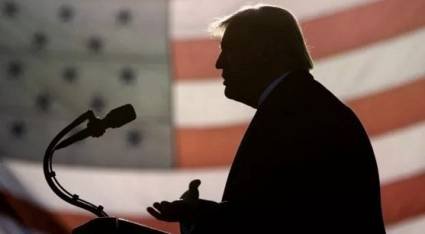
Donald Trump’s shameful legacy against Cuba. Autor: Juventud Rebelde Published: 17/01/2021 | 12:51 am
Moving trucks leave the White House loaded with large boxes containing the occupying family’s belongings until January 19, evicted by the decision of U.S. voters and the Electoral College, no matter what the outgoing tenant Donald Trump did and did not do to stay in place.
No tricks, unsuccessful lawsuits about alleged fraud and even the seizure of Congress by its white supremacist fanatics, some armed, and willing to do anything, as the gallows erected in front of the Capitol pointed out. A Pew Research Center poll says that about 70 percent of Americans now disapprove of how he has done his job.
Trump takes his stuff, but leaves behind a legacy of worse stuff than anyone would want. I will not speak of the mishandling of the Covid-19 pandemic; nor of the internal chaos in a nation more divided than ever before; nor of the discredit of his unilateral and unconsultative policies on the international stage.
I will limit myself to the adverse legacy of injustices, aggressions, revanchist measures, outrageous decisions on the human rights of a people, contained in their policy against Cuba.
The President who is now taking office, Joe Biden, is also carrying this burden, destined during the four-year term of office to please an anti-Cuban clique, which as of January 20 will be his neighbors in Miami, in exchange for their votes and whose aim is to destroy a nation, a people, a social, political and economic system that they viscerally hate.
Over the past few weeks, Mike Pompeo and other retreating officials have exaggerated anti-Cuban actions to multiply the damage and put obstacles in the way of any reversal. In a low and final blow he registered Cuba on the exclusive, sinister and politically motivated list of “countries sponsoring terrorism,” a deliberate lie that has earned the revulsion of various personalities and organizations worldwide.
The final straw came last Friday when the Treasury Department included the Cuban Ministry of the Interior and its head, Brigadier General Lázaro Alberto Álvarez Casas, on a list of those sanctioned for “persecuting or punishing dissidents”, meaning the salaried and discredited acolytes of San Isidro.
“The United States will continue to use all the tools at its disposal to address the terrible human rights situation in Cuba and elsewhere,” said Treasury Secretary Steven T. Mnuchin.
Both measures against the clock add up to more than 230 approved against Cuba in four years of (dis)government, trying to dent and sink 62 years of resistance that serves as an example to the world and, what hurts them most, to a united nation moving against the tide.
A review, without going deeply into all the nooks and crannies of the operations from Washington to affect the economy of Cuba, allows us to define that the intensification of the blockade and the advertising of lies were centered on ruining the tourist industry, stopping Cuban medical collaboration and cooperation, closing family remittances, paralyzing investments by third parties, financing and trade of the world with and from the island.
The enforcement of all the evil instruments of the Helms-Burton Act was the tool used during these terrible 1461 days by Trump and his people, in which they reversed, or more appropriately, curtailed the policy of rapprochement inaugurated by Barack Obama when, on December 17, 2014, together with Army General Raul Castro, they announced the reestablishment of diplomatic relations, and in two years there were certain achievements of mutual benefit, in favor of a better neighborhood.
The undesirable legacy
Trump’s unseemly anti-Cuban dossier includes organizing, orienting and financing small groups to defame the Revolution and try to turn them into “the leaders” of a subversion that produces a change in the political model on the island. We have already seen how they have defended them…
But the story began early, not with this sin of an idiotic slander, but with aggressive prohibitions and sanctions, including collusion with other governments in the region to attack the Cuban economy and make it as worn out as possible, which in the last year joined the damage caused by the Covid-19.
He did everything possible to bring the situation up to his promise as a presidential candidate made in Miami to hard-line Cuban Americans, and to directors of the terrorist Cuban-American National Foundation (CANF), in September 2016: to break relations with Cuba.
On June 16, 2017, in Miami, he signed the so-called Presidential National Security Memorandum on Strengthening U.S. Policy Toward Cuba. It restricted the travel of US citizens to the Caribbean country and also prohibited economic, commercial and financial transactions between US companies and Cuban companies linked to the Revolutionary Armed Forces and the intelligence and security services.
The ban on cruise ships that successfully traveled to Cuban ports was among the first restrictive measures. They reaffirmed the exorbitant fines on companies that violated the blockade – a practice reinforced by Obama – and strictly enforced the ban on the use of the dollar in Cuba’s international transactions.
By November 2017, Trump had completely changed the policy on U.S. travel to the Caribbean nation, which, with the easing of the previous administration’s blockade rules, allowed 12 categories of specific activities, although tourism remained prohibited.
As a result, the airlines began to shut down travel to Cuban airports, which had been resumed on August 31, 2016, after 55 years of isolation. Other bans followed. On December 10, 2019, the Trump administration ended the bridge established three years ago between the US and several provinces in Cuba by suspending regular flights to those destinations except for Havana.
In addition to being a coup de grace against family ties and the state tourism industry, the impact on small private businesses (transportation, the well-known palates, rental houses, artisans, and many other businesses) directly or indirectly linked to tourism was notable.
Since assuming the presidency of his country, Trump extended, year after year, the Law of Trade with the Enemy, a regulation that serves as the basis for the blockade laws, and maintained his authority to sanction through executive decrees.
By establishing sanctions against the Venezuelan oil sector, Trump was also establishing a measure to deprive Cuba of fuel with the intention of delivering a coup de grace in the midst of the terrible 2020, which together with the decision to re-impose the limit of up to ten percent on U.S. components for products that the island can import, points against any development sector.
The Trumpist push to impose limitations of all kinds was made despite the fact that U.S. legislators and various economic sectors rejected the restrictions, which hardened the economic, commercial and financial blockade imposed by Washington against Cuba, which also hurt sectors of the U.S. economy and the rejection of the blockade by a part of the Cuban migration wishing to have no obstacles of any kind to their family relations.
Perhaps one of the most monstrous actions linked Trump to equally aberrant rulers in our hemisphere. The accusations against Cuban medical cooperation justified countries like Brazil, Bolivia under the coup d’état and Ecuador, closing the doors to solidarity and also to the right to health of the most humble of their peoples by putting an end to the agreements that made possible the presence of hundreds or thousands of Cuban doctors, and put pressure on others to follow that inhumane path in the midst of the pandemic.
Trump definitely closed down spaces for dialogue and cooperation, and any possibility of advancing, as intended, toward a “civilized coexistence”.
This is, in short, the abusive legacy that Donald Trump leaves to Joe Biden.
If the Capitol Assailants had been Black?

TODAY IN HISTORY
What if the assailants at the Capitol had been African Americans?
In the 1940s and 1950s, the segregationists adopted the flag as the emblem of their battle to prevent movements that emerged to advance the rights of African Americans. In essence, it represents the racist southern culture
It was not by chance that a mob of supporters of President Donald Trump, all of them white-skinned, razed the Capitol’s fences, pounced on the police guarding the building and, with little resistance, forcibly entered the compound. Nor was it by chance that one of them walked through the corridors waving an enormous “confederate” flag.
This was possible because hours earlier, Trump had incited them in the Save America march, to support him in a desperate and last attempt to prevent Congress from certifying Joe Biden’s already recognized victory.
It was, moreover, a racist assault. No African Americans participated in that violent demonstration, and the Confederate flag, a historic symbol of racism and the defense of slavery in the United States, was flown for several hours without being stopped by any police officer.
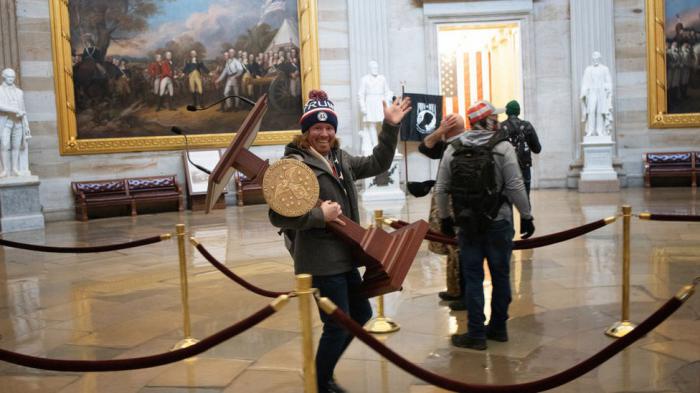
Photo: Reuters
Some of the leaders of the demonstration, identified as members of extreme right-wing conspiracy theory and white supremacist organizations, are trying to distance themselves from the vandalism, claiming that the destruction was caused by anti-fascists.
But the police have already located and arrested Jacob Anthony Chansley, known as Jake Angeli, who is considered the “shaman” of the QAnon. Members of the QAnon movement, which appears to have begun in October 2017, consider Trump a hero.
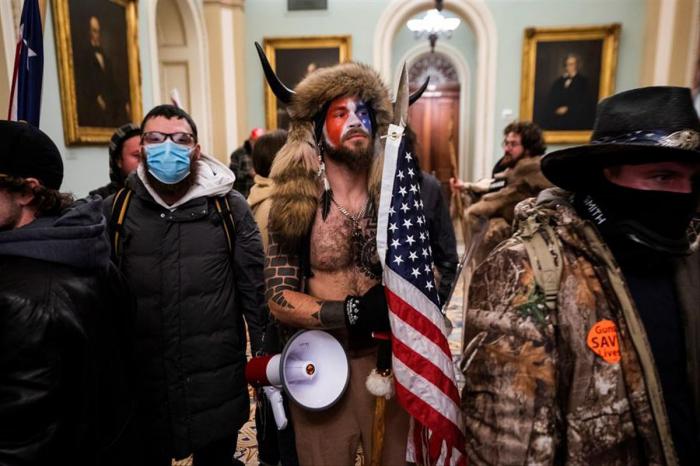
Trump supporters stormed the Capitol after a march in support of the outgoing president. Photo: Reuters
Its militants believe an unfounded theory. They say that President Trump is waging a secret war against pedophiles from the elite of the U.S. government, business and media who worship Satan, and that one day there will be a reckoning among political figures like former presidential candidate Hillary Clinton.
In this case, Jake Angeli is the man photographed inside Congress with his face painted and dressed in a bearskin and horns on his head. In addition, he carried a spear with an American flag tied to the blade, and who calls himself “The Wolf of Yellowstone.”
Richard Barnett, a follower of President Trump, is also in custody. He is pictured sitting in the office of U.S. House Speaker Nancy Pelosi.
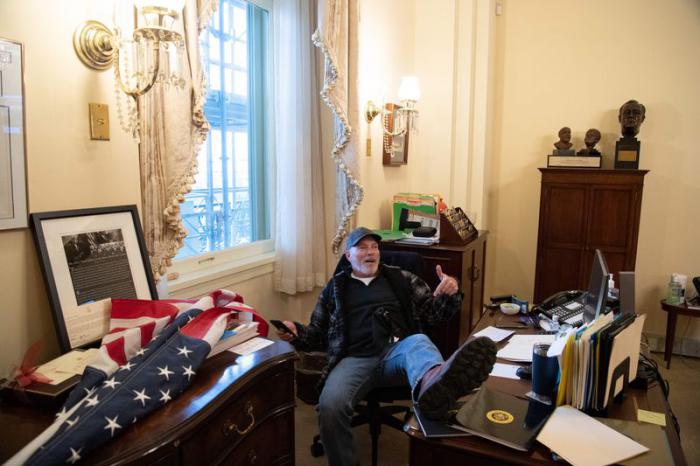
Trump supporters stormed the Capitol after a march in support of the outgoing president. Photo: Reuters

Trump supporters stormed the Capitol after a march in support of the outgoing president. Photo: Reuters
Adam Johnson, who was photographed taking Pelosi’s lectern, also remains in police custody.
WHAT IF THE ASSAILANTS AT THE CAPITOL HAD BEEN AFRICAN-AMERICANS?
The Black Lives Matter Global Network Foundation, an international and decentralized movement originating within the African American community, stated:
“When African Americans protest for our lives, we often encounter National Guard troops or police armed with assault rifles, shields, tear gas, and combat helmets.
“When whites attempt a coup, they run into a small number of agents who can’t do anything and who even take selfies with the terrorists,” they said.
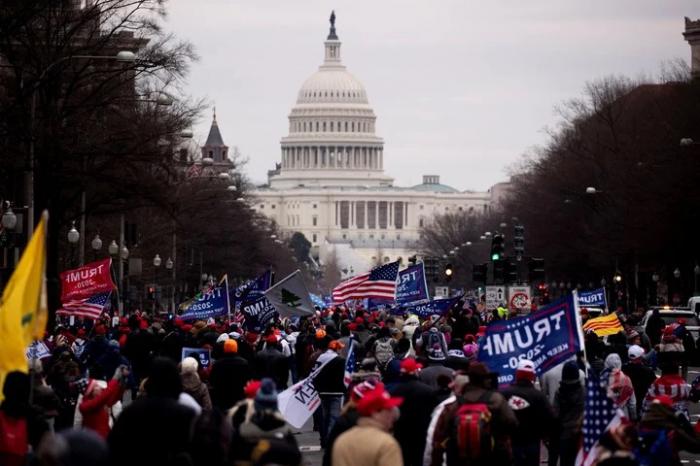 A statement on Twitter was written by Michelle Obama, wife of Barack Obama, the first Black president of the United States:
A statement on Twitter was written by Michelle Obama, wife of Barack Obama, the first Black president of the United States:
“To those who criticize others as unpatriotic for simply kneeling in protest, to those who wonder why we even have to remember that Black lives matter, it has become painfully clear that some Americans are, in fact, allowed to degrade the flag and symbols of our nation. What do they have to say now?”
What do Joe Biden and Donald Trump think about January 6?
NBA legend LeBron James was blunt in his denunciation:
“We live in two Americas. “If people like me – African Americans – had stormed the Capitol, what would have been the result? I think we all know. We know what would have happened to them if they had approached the Capitol, let alone entered the offices and the hallways.”
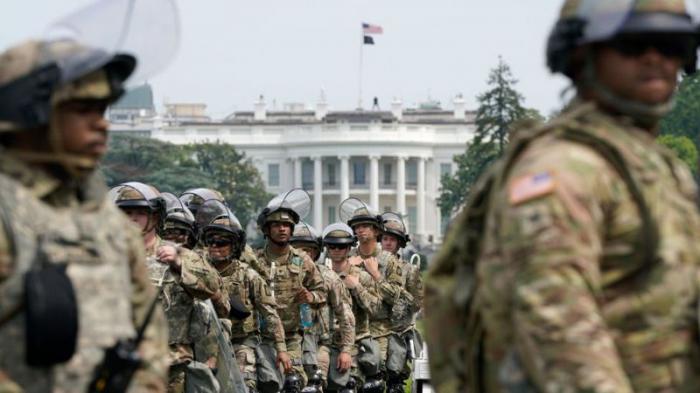
Photo: Reuters
Florida Senator Marco Rubio released a video on Friday comparing the attack on the Capitol by supporters of President Donald J. Trump with protests by Black Lives Matter, the racial equality and justice movement.
Rubio said the invasion of Congress was similar to the protests the left had been “justifying” last summer in cities across the United States following the murder of George Floyd, an African American who died in Minneapolis police custody.
So far, more than 80 people have been arrested and four died in the assault on the Capitol. Police found 11 Molotov cocktails on an Alabama man.
THE CONFEDERATE FLAG CARRIED BY THE CONGRESSIONAL ASSAILANTS
Between 1861 and 1865 a civil war developed in the United States that confronted the southern states (Confederates) that defended, contrary to the foundations of the northerners whose leader was Abraham Lincoln, the maintenance of slavery in the states of South Carolina, Mississippi, Florida, Alabama, Georgia, Louisiana, Texas, Virginia, Arkansas, Tennessee and North Carolina.
After the defeat of the Confederate states, the banner carried by their troops in the civil war reduced its public presence but reappeared in the mid-twentieth century with racial segregation.
The first Confederate flag was composed of two red bars and a white one in the middle, with a blue box in the upper left that had a circle formed by stars. However, its successor, the red one, which contains a blue cross with white borders and stars, was the one that became popular. It was the symbol of the Battle of Virginia.
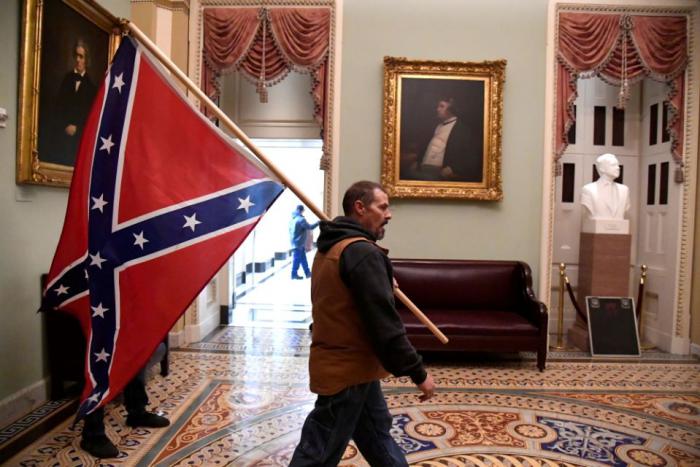
Trump supporters stormed the Capitol after a march in support of the outgoing president. Photo: Reuters
In 1863, the Confederate Congress recognized the Northern Virginia flag as its official symbol.
The descendants of Civil War veterans placed it on the nation’s monuments, so it gradually became an icon of Southern culture
In the 1940s and 1950s, segregationists adopted the flag as the emblem of their battle to prevent movements that emerged to advance the rights of African Americans. In essence, it is the representation of Southern racist culture.
Some time ago, the U.S. Navy decided to ban this flag from all Navy facilities, including ships, planes and submarines.
Sources: (not translated)
El significado sureño y racista de la bandera ondeada durante el asalto al Capitolio en EEUU. Publicado en Yahoo Noticias el 7 de enero de 2021.
La herida racial vuelve a sangrar en el asalto al Capitolio. Publicado en El Periódico el 8 de enero de 2021.
Toma del Capitolio, ejemplo de desigualdad racial. Publicado en Sun Sentinel el 7 de enero de 2021.
¿Qué significa la bandera confederada y por qué causa polémica en EU?. Publicado en Vive USA el 12 de junio de 2020.
Biden and Trump on January 6, 2021

What do Joe Biden and Donald Trump think about the violent demonstrations in Washington? ( + Photos )
U.S. lawmakers were meeting Wednesday to confirm Joe Biden’s victory in the presidential election amid protests by Trump supporters both outside and inside the Capitol
Author: Digital Editor | internet@granma.cu
January 6, 2021 19:01:25
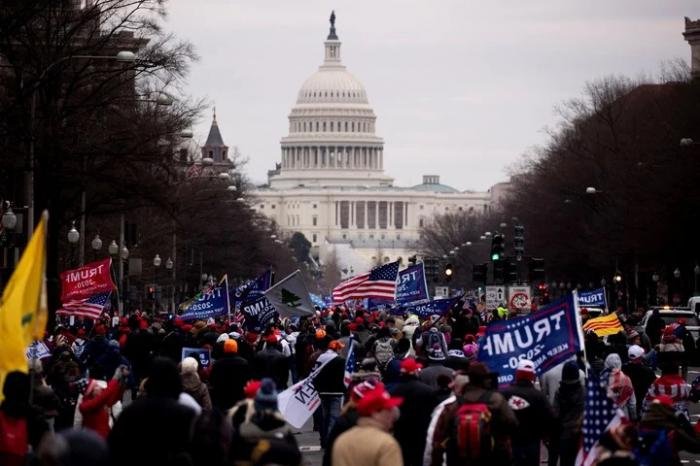
Outgoing U.S. President Donald Trump called on his extremist supporters to stop violent demonstrations in Washington, but insisted there was “election fraud.:
“I don’t want anyone to be hurt (…) I love you, you are very special, but go home. I know you are hurt. We have an election that was stolen from us, and you know it, especially from the other side,” said Trump according to Telesur TV.
The outgoing president warned that this is a very difficult time, “there was never a time like this, where something like this happened, that something was stolen, from everyone, from you, from me, from the country. It was a fraudulent election”.
Trump’s call came after a group of extremists stormed Congress to prevent certification of Biden’s election victory. At that time, the congress members left the Capitol in the custody of the authorities.
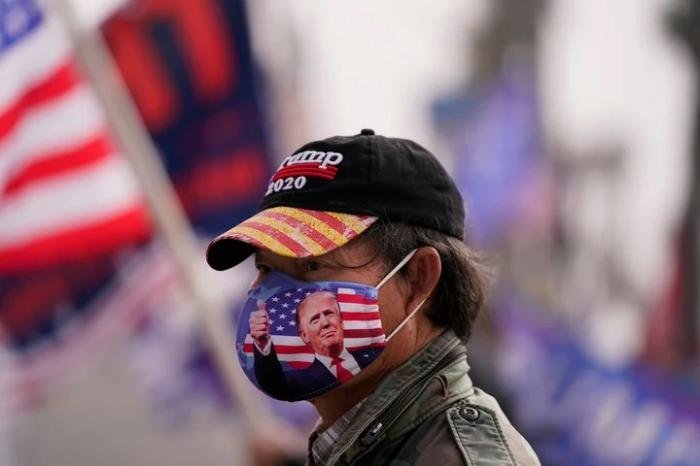
Photo: Internet
On Wednesday, president-elect of the United States, Joe Biden, repudiated the violent invasion by supporters of Donald Trump in the Capitol that caused the cancellation of the certification of the votes.
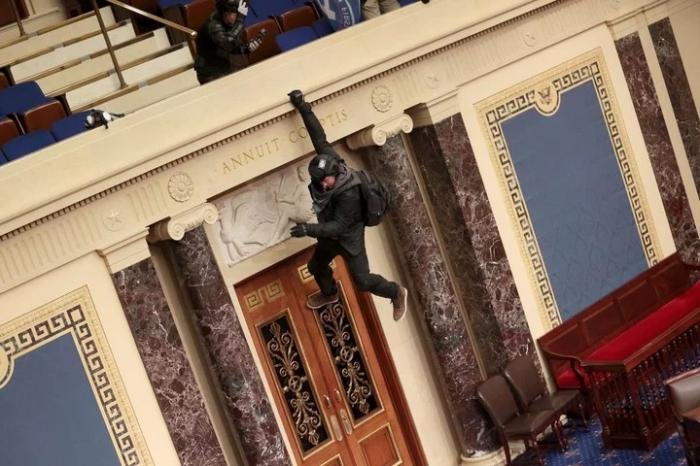
Photo: Internet
“Attacking the capitol, destroying the US Senate, endangering security. This is not a protest, it is an insurrection … I call them mafiosi, they are not attacking democracy,” Biden said.
The president-elect rejected the position of Trump’s fanatics who attacked the certification of last November’s votes, “we are seeing a small number of extremists who are dedicated to breaking the law. This is chaos and it must end now,” he added.
“The job in the coming years is to restore democracy, honor and respect. Solve the problems by looking at ourselves without stoking hatred,” the new White House tenant said.
Finally, he urged all leaders to work together to recover democracy in the country of the North, “democracy is fragile and to preserve it we need people of good will, courageous leaders, who are not dedicated to power, but to the common interest,” he concluded.
U.S. Congress meets Wednesday to certify Biden’s victory
U.S. lawmakers were meeting Wednesday to confirm Joe Biden’s victory in the presidential election amid protests by Trump supporters both outside and inside the Capitol itself.
A session that, every four years, goes unnoticed by most people has as an ingredient this year the announcement of some Republican senators and representatives, who have pledged to support President Donald Trump’s efforts to overturn the result through a formal sessional objection, in an attempt that is almost certain to fail.
The two houses of Congress, the House of Representatives and the Senate, in a joint session this Wednesday will open sealed certificates from all 50 U.S. states containing a record of their electoral votes.
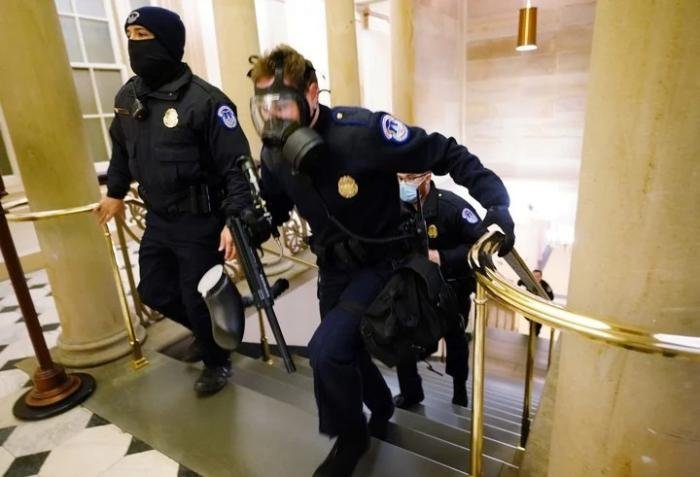
Photo: Internet
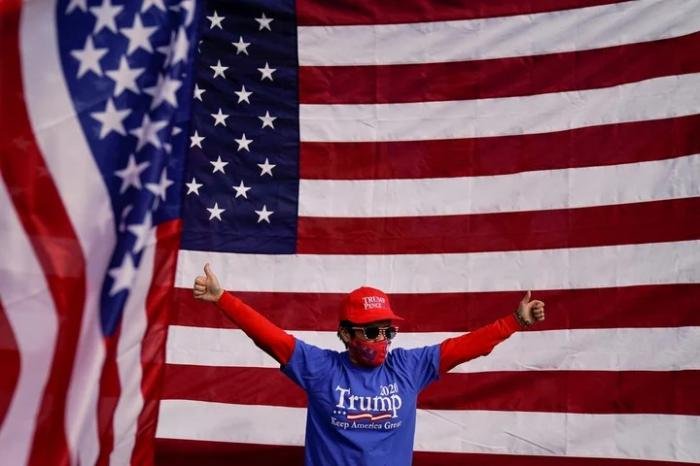
Photo: Internet
Under the U.S. system, people cast their votes for “electors,” who in turn formally vote for candidates weeks after the election, which occurred on December 14, when Biden received 306 votes under the electoral college system, compared to 232 under Trump.
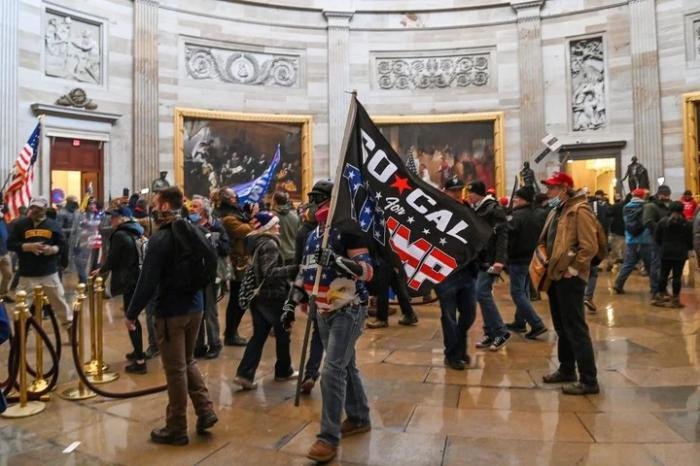
Photo: Internet
A truck full of explosives in Washington, D.C.

Police found a van full of explosives and weapons near the Capitol on the day of the riots
A 70-year-old man is charged with possession of eleven Molotov cocktails, as well as an assault rifle and three handguns
By Russia Today
digital@juventudrebelde.cu
Translated and edited by Walter Lippmann for CubaNews.
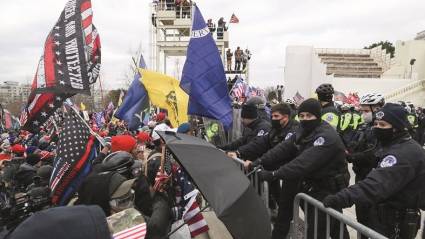
Led by Trump, his followers forced their way into the Capitol in Washington. Photo: Reuters Published: 01/06/2021 | 11:02 pm
The District of Columbia Attorney’s Office has filed charges Friday against an Alabama man who allegedly parked a van with 11 Molotov cocktails and other weapons near the Capitol on Wednesday, the same day of the congressional riots.
According to the statement from the Attorney General’s Office, on January 6, Capitol Police officers were warned of the possible presence of explosive devices in the area surrounding the legislative seat. During a protective sweep of the area, agents observed the handle of what appeared to be a firearm in the passenger seat of a pickup truck, which, according to their database, belonged to Lonnie Leroy Coffman, a 70-year-old man from Falkville, Alabama.
When they proceeded to search the vehicle, the police found a pistol, an assault rifle, as well as rifle clips loaded with ammunition and components for the manufacture of eleven Molotov cocktails (glass jars filled with flammable substances, rags and lighters).
Later, Coffman was stopped near his truck when he tried to return to his vehicle. When he was searched, he was found to be carrying two other guns.
The man has been charged with illegal possession of a destructive device, which carries a maximum prison sentence of up to 10 years, as well as carrying an unlicensed gun, which carries a maximum prison sentence of up to 5 years. Coffman remains in custody pending a hearing scheduled for Tuesday, January 12.
Donald Trump’s Dark Path

Donald Trump’s Dark Path
An unacknowledged or reluctantly-admitted defeat, and a forced commitment to a peaceful transition of power, are still far from the final closure on the chaos
Translated and edited by Walter Lippmann for CubaNews.
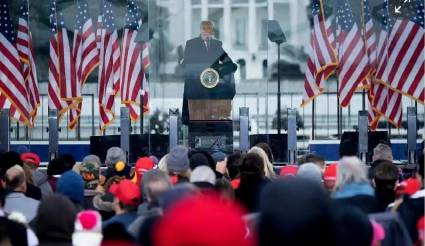
Trump incited them and his followers left for the Capitol. Photo: AFP Published: 07/01/2021 | 08:29 pm
The United States has experienced a very bitter drink of the acíbar [aloe juice] or purgative that has made other nations of the world drink more than once with names of seasons or colors. As an unusual fact for the idyllic image with which the American democracy has sold itself and deceived the planet throughout three centuries, we have witnessed an insurrection of the most extreme and violent ultra-right, determined to maintain the political power of he who is its image and likeness.
What Trump Leaves and What Awaits Biden

What Trump leaves and what awaits Biden
The times are not good, and any political, social or economic agenda of a beginning President must be subject to the dictates of confronting the COVID-19 pandemic plus the vicissitudes of a very complicated Trumpian legacy
Posted: Saturday 02 January 2021 | 06:10:07 pm.
 By Juana Carrasco Martin
By Juana Carrasco Martin
Translated and edited by Walter Lippmann for CubaNews.

The victory to Joe Biden despite not being charismatic, and then made him categorically assert in an opinion article in The New York Times at the beginning of last August that “The keys predict that Trump will lose the White House Author: Victor Manuel Published: 02/01/2021 | 05:47 pm
Allan Lichtman, professor of history at American University, was also not wrong in predicting the winner of the 2020 presidential election. His record of accurate predictions, which dates back to 1984, remained intact.
The clues worked, which he explained in an interview with The Morning Show on Wisconsin Public Radio, why they were giving Joe Biden the victory even though he was not charismatic, and which then made him state categorically in an opinion piece in The New York Times in early August that “The clues predict that Trump will lose the White House:
The terrible numbers of the coronavirus pandemic, the national movement of protest against police brutality and systematic racism, the social unrest and economic collapse that erased the economic gains Donald Trump was presenting until the
Covid-19 appeared on the scene.
To tell the truth, Trumpism and its mishandling of the unexpected situation of this fateful 2020 and its aftermath, defeated the tycoon who administered the United States for four years as if it were an enormous capitalist monopoly, and not the imperial representative of big business that must follow the rules of the game because it is a showcase of democracy.
Without a doubt, the pandemic is rising as the giant to be faced by the elected president, although he already has the weaponry of the vaccine. A population of more than 300 million inhabitants is not immunized -what remains to be seen effectively- in a flash, therefore the numbers of those infected and killed and their consequent involvement in the country’s economy will continue to grow.
Without a doubt, the first months of Joe Biden’s administration will be torturous, and he does not have a Congress in which the Democrats, while retaining a majority in the House, will have to fight tooth and nail in the Senate.
Now, the legacy that Donald Trump leaves behind is much more notorious and damaging, because he led the United States into a state of extreme polarization and manipulated a good part of the American people in such a way that his faithful followers and the 74 million Americans who voted for him have accepted impunity and the existence of the swamp of corruption at the highest levels of the nation and of the power elites, even though one of his campaign promises was to end the “Democratic” swamp.
The pardons of these final days of his presidency speak for the clarity of that quagmire, when a good part of the pardons and annulments of sentences are for people very close to their political or family environment, faithful to their actions, millionaires who have committed tax fraud and other economic crimes.
An “achievement” of Trump, completed this one in the year 2020 will probably give a substantial turn to the legality towards the right. He appointed three Supreme Court justices – a lifetime appointment – and 25 percent of the federal judiciary. In doing so, he has reversed or broken the balance of federal appellate courts and, in the case of the highest court, could result in an alteration of the government’s regulatory power, the right to abortion, and the immigration law, to name three that are under debate and in the face of which the positions of the outgoing president, who will be sworn in on January 20 as the nation’s 46th president, are diametrically opposed.
According to judicial experts, and Democrats in particular, this is a takeover by the more conservative wing of the Republicans.
How will Biden deal with the very serious problem of institutionalized racism and its most public and violent expression, police brutality? Not a few analysts believe that the extreme white right promoted by Trump will persist in asserting its “right” to supremacy.
While Trump could not build the physical wall with Mexico, nor make his southern neighbors pay for it, since the cost of the remodeled areas and the little that was new took it out of the pockets of U.S. taxpayers, the restrictions he imposed on immigration have more than made up for that fence and it will have to be seen how the coming administration undoes them or how the judiciary keeps them in check, but he owes it to the Latino population and to the dream of millions of undocumented people that Trumpism turned into a nightmare.
In any case, Biden, whose motto was to recover “the soul of the nation,” faces an enormous challenge because that nation is divided and not precisely by a line of the color of the parties, but one that puts liberal democracy in check, with the promotion of distrust towards government institutions, the press, science and the electoral process itself.
Biden, on the other hand, was forced to wink at American progressivism and within the Democratic Party and must also comply with them, or at least try to do so, and there are not a few matters to approve of, nor are they easy.
Among them are education – only with the insurmountable debt of the university students will he have a good headache -; public health, which the Covid-19 has called into question, should introduce universal public insurance; organized labor, when unemployment reaches millions of Americans, hit by the closing of businesses of all sizes and sectors of the economy, and where the demand for the minimum wage will return with force.
Taxes cannot be absent from that list – when the reductions executed by Trump served to make the richest people benefit highly from 60 percent – and now it could not fail to benefit those with the lowest incomes, workers, ethnic minorities, women, immigrants.
A 180-degree turnaround is now mandatory on key foreign policy issues and on relations with allies, friends, and even adversaries. A field in which Trump has sown tensions and economic wars.
In some cases it will be “easy” for him, such as returning to the Treaty of Paris, the World Health Organization, restoring civilized exchanges with his allies in the European Union and NATO, among others.
Not so with respect to Iran, China, Russia, even Latin America, where renewed airs of sovereignty are returning in some countries and with them of integration.
How much it will maintain from the policies of sanctions, from the commercial wars, established with high tariffs that not only confronted the US with the Asian Giant and other adversaries, but also political and strategic allies for that vision of fierce business competition that prevailed for four years in the White House.
Will Biden be able to respect the right of the Palestinian people by reversing Washington’s embrace of Netanyahu’s apartheid?
There’s plenty of room to cut through, and we’ll have to wait for the new president’s first steps. One thing is certain: 2021 will not provide an answer to all the uncertainties, since the Covid-19 will continue to implement rules.
However, the clouds of four years of trumpism will not be easy to clear. Economist and columnist Robert Reich has said that the most vile legacy that Trump will leave is the acceptance of its behavior, and practically half of the American population seems to be enrolled in that list.
A second inauguration on January 20th?

A second inauguration on January 20th?
Outgoing President Donald Trump is organizing a “second inauguration” online at the same time that Bidel will take his oath of office and officially begin the term of 46th U.S. President, Democrat Joe Biden
 Author Juana Carrasco Martín | juana@juventudrebelde.cu
Author Juana Carrasco Martín | juana@juventudrebelde.cu
December 22, 2020
Translated and edited by Walter Lippmann for CubaNews.
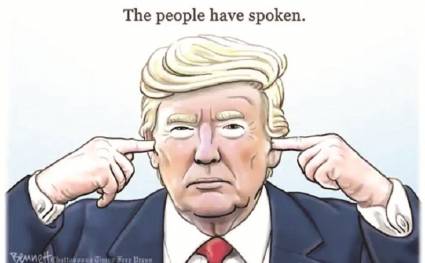
People have spoken, says cartoonist Author: Juventud Rebelde Published: 22/12/2020 | 12:34 am
The height of irrationality among supporters of outgoing President Donald Trump: they are organizing a “second inauguration” for him, on January 20, at noon, at the same time that he will be sworn in and officially begin the term of 46th U.S. President, Democrat Joe Biden.
Trump’s inauguration will be online and can be considered a provocation and probably a violation of constitutional norms, but there they go proclaiming that it is their right “to freedom of expression.”
As social networks endure everything, more than 60,000 Facebook users are promoting the event they have called “Donald J. Trump’s second presidential inauguration ceremony,” and they claim in a “disclaimer” that they are a sum of 325,000 private individuals, not affiliated with any formal organization, who want to show their support for “President Donald Trump”.
In the face of such ignorance of the popular will expressed in the ballot box and the certification of the Electoral College, Facebook has simply issued another “disclaimer”: “Joe Biden is the president-elect. He will be inaugurated as the 46th president of the United States on January 20, 2021.”
As reported in The Hill, the event will be hosted by Ilir Chami and Evi Kokalari, who was allegedly part of Trump’s 2020 campaign and is featured in regular on right-wing news networks such as One American News Network.
In a recent post on the Facebook page, Kokalari re-posted Facebook’s disclaimer, writing: “Our voting rights are under attack! So is our freedom of speech! And FB’s disclaimer in this post proves it.”
One could not expect less from these fans when Trump has not recognized himself as a loser and continues to encourage such false news and disruptive actions.
Rumor has it that in his obsession with staying in the White House he seems to have in mind appointing attorney Sidney Powell as special counsel to investigate allegations of voting fraud.
For identification purposes, Powell was separated from the Trump campaign in November when he was mocked for claiming that there was a broad “national conspiracy” to deny the current president victory and an “immense influence of communist money from Venezuela, Cuba and probably China” that interfered with the elections, in addition to claiming that the voting machines used were “created in Venezuela by Hugo Chávez” to ensure that he would never lose an election.
At the time, Rudy Giuliani, Trump’s personal lawyer, had said in a statement: “Sidney Powell is practicing on her own. She is not a member of Trump’s legal team. Nor is she an attorney for the President in her personal capacity.”
Now, that statement comes crashing down. Desperate Trump put her in the ring and provided evidence that anywhere in the world psychiatry would have already rendered a verdict of committal or at least strong treatment of insanity.
From the “Monkey Trial” to Our Times

From the “Monkey Trial” to Our Times
In July 1925, 95 years ago, in the small town of Dayton, Tennessee, the so-called “Monkey Trial” was held. It all began with the arrest of teacher John Scopes, who was accused of explaining to his high school students Darwin’s Origin of Species.
By Abel Prieto Jiménez
July 17, 2020
Translated and edited by Walter Lippmann for CubaNews.
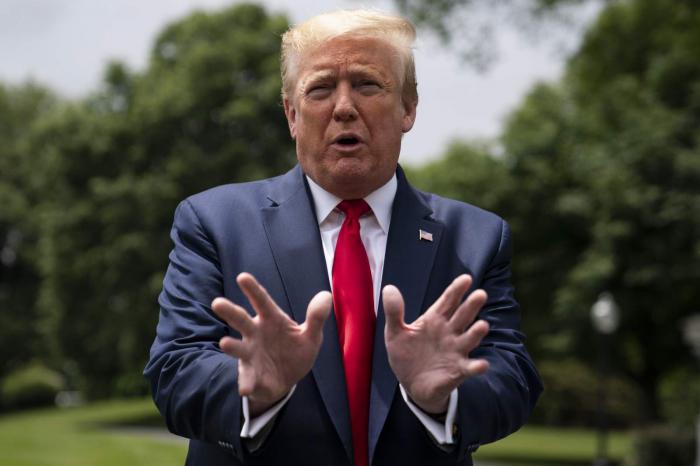
The same irrational obstinacy of Darwin’s deniers reappears in Trump’s dismissive attitude towards science and scientists and in his erratic and criminal response to the pandemic. Photo: AFP
In July 1925, 95 years ago, in the small town of Dayton, Tennessee, the so-called “Monkey Trial” was held. It all began with the arrest of teacher John Scopes, who was accused of explaining to his high school students Darwin’s Origin of Species.
He had violated a Tennesee law that forbade “the teaching of any theory that denies man’s Divine Creation as it is in the Bible, and replaces it with the teaching that he is descended from an order of lower animals.”
Many local people demonstrated in the streets with signs and shouts in favor of their religious values and against Scopes and Darwin himself, whom they saw as representatives of the Devil.
From the caricatured simplification of the thesis of evolution (“we are descended from the monkey”), the name with which the trial passed into history was born. It received great publicity in its time and ended up being presented as a duel between two sides, “creationists” and “evolutionists”, and between two prestigious lawyers.
The press in the North showed the clash between a world view that was typical of “deep America”, closed in itself, rural, moralistic, anti-scientific, very religious, and another “free thinker”, open to the debate of ideas and the advances of science.
Scopes was finally found guilty; although he was only sentenced to pay a fine and did not go to prison, as the prosecutor and the extremist sectors of the people wanted.
A theatrical piece based on the trial was released years later, and from it several versions were made for film and television. The sympathies in these plays tend to be on the “liberal” side, although, as in the U.S. entertainment industry, there is no serious investigation into the real causes of the conflict.
Within the questionable and undemocratic US electoral system, “Deep America” contributed decisively, in 2016, to Trump’s victory.
In that space, more cultural than geographical, analysts locate the “hard” electoral base of the ultra-right, associated with the stereotype of the white, Protestant, sexist, homophobic, illiterate, racist, hunter and gun lover, attached to Republican politics, the most conservative morality and the traditional concept of the family. With an exalted and messianic image of his country, he lacks curiosity about universal culture and that which thrives in New York and other US cities with a cosmopolitan vocation.
Joe Bageant wrote an incisive, exceptional book, Chronicles of Deep America, in which he characterizes the scam of the Yankee model and denounces the decline of the Empire on a planet controlled by corporations. His description of “that provincial America,” inhabited by churchgoers who “fanatically listen to the pastor explain the infallibility of the Bible in relation to all known matters, from biology to baseball rules,” and “are not even able–and do not care much about–to put Iraq or France on the map, assuming they have one, is very valuable.
Many believe that Trump is addressing this hard core of voters most of the time, in his speeches, in his tweets, in his permanent show.
The same irrational obstinacy of Darwin’s deniers reappears in Trump’s dismissive attitude toward science and scientists and in his erratic and criminal response to the pandemic.
Trump has also exceeded the political use of the Bible. On June 1, he ordered the removal of anti-racist protesters to walk through a park to St. John’s Church and “hold up a Bible in front of the cameras, like some kind of championship trophy,” as one journalist ironically put it.
Mariann Budde, the bishop of the Episcopal diocese of Washington, said: “It was traumatic and deeply offensive. Something sacred was misused for a political gesture.
Last Friday, in Florida, at the Doral Jesus Church Worship Center, a refuge for terrorists, in a shameful rally where he avoided talking about the health catastrophe, Trump mixed internal and external enemies under the “caused” word socialism. The Democrats, he said, are standing alongside those who are knocking down statues. And he accused them of wanting to do the same with the statues of Jesus Christ.
An evangelical Christian of Cuban origin went so far as to say that Trump is “God’s chosen one” to stop the communist threat in the United States.
Let us remember that in the 2016 campaign this “chosen one” used inquisitorial language to refer to Sanders and Hillary Clinton: “He made a pact with the devil. She is the devil.” This is the kind of medieval insult used in 1925 by the people of Dayton to attack Scopes and Darwin.
Trump takes his politics to Tulsa

Trump went with his politics to Tulsa, scene of the worst massacre of African Americans in recent U.S. history.
By Natalia Plazas
June 20, 2020
Translated and edited by Walter Lippmann for CubaNews.
In 1921 Tulsa, the city Donald Trump chose to resume his campaign for the presidency, was the scene of one of the most atrocious massacres in U.S. history against the Black community. Nearly a hundred years after the event, the facts remain virtually unknown to society.
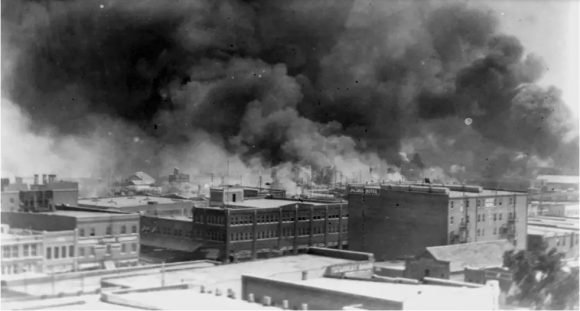
Smoke rises from buildings during the 1921 Tulsa, Oklahoma, USA massacre. Photo: Reuters
Donald Trump hit the nail on the head when he decided to resume his campaign for reelection in Tulsa, Oklahoma. Tens of thousands of his supporters await him there, but there is also a growing call for remembrance and justice from activist groups who remember that that city has not healed the wounds of the worst massacre in the country’s recent history against the African-American community.
On the night of May 31 to June 1, 1921, an entire neighborhood was razed to the ground and 300 black citizens were killed. The massacre began when a white crowd came to lynch a black man accused of sexually assaulting a white woman. That, supposedly, was the trigger for the tragedy, but history has revealed a much more perverse situation.
In the 1920s, the Greenwood neighborhood, a black enclave in the city of Tulsa, was noted for its economic prosperity. The distribution of land after the end of the American Civil War had benefited some African-American and Native American communities, and as a result Greenwood had become stronger, despite being segregated, like any black neighborhood at the time.
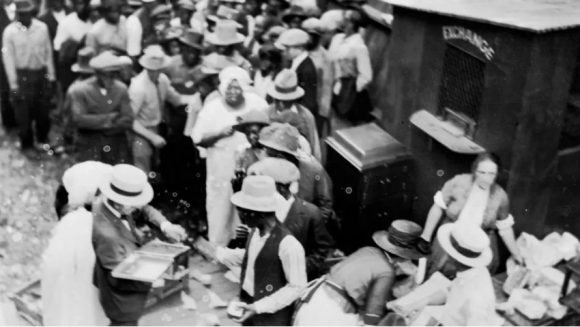
Archive image. A crowd of mostly African Americans lines up at the Exchange booth in Tulsa, Oklahoma, in 1921. © Reuters
From ‘Black Wall Street’ to a neighborhood in the ashes
Such was the commercial and economic success forged in Greenwood that it was commonly called the ‘Black Wall Street’, but soon its good fortune would bring it ruin. Members of the white community began to view their neighbors’ bonanza with suspicion and, interested in occupying their land during the railroad expansion, decided to attack the neighborhood.
On the night of May 31, a crowd of white men, supported by local authorities and even police, arrived in Greenwood and charged at the African-American population and their homes. The mob burned down homes and businesses to the point that when the situation calmed down hours later, at least 35 whole blocks had been left in rubble.
The blow took away the good fortune of the neighborhood forever. In the wake of the event, Greenwood’s recovery has been frustrated by the creation of laws promoting zoning or by building restrictions. Today in Tulsa, the social gap between blacks and whites is notorious. According to a Human Rights Watch report, poverty is almost three times higher among black citizens than among white citizens.

Archive image. A truck carrying soldiers and African Americans near the Litan Hotel during the 1921 Tulsa, Oklahoma race massacre. © Reuters
A Donald Trump rally ignites misgivings in a remote society
With Trump’s visit, originally scheduled to coincide with the celebration of Black Independence Day on June 19 [Juneteenth] and postponed amidst national protests against racism, the call for historical recognition of the victims and economic reparations for their descendants has intensified more than ever.
Less than a year before the 100th anniversary of the Tulsa incident, justice has yet to be established, despite the fact that the case has even been brought before the U.S. Supreme Court. Both lower courts and the high court have dismissed the claims. Currently, only two survivors of the massacre are still alive.
But Trump’s arrival has not only put the spotlight on a forgotten chapter of American history. His desperate attempt to revive in Oklahoma an image that has deteriorated in recent months due to the economic impact of the pandemic has highlighted the differences between his supporters and those who demand changes in the treatment of the African-American community.
“Any protester, anarchist, agitator, looter, or small-time person who goes to Oklahoma, please understand that they will not be treated as they have been in New York, Seattle, or Minneapolis. It will be a very different scene,” the president said before embarking on the trip to Tulsa.
The comment, which his critics call conflictive and divisive, comes at a time when the rejection of racial violence in the United States shows its greatest increase in decades, with weeks of massive demonstrations in multiple cities around the country that have also reached the doors of the White House.
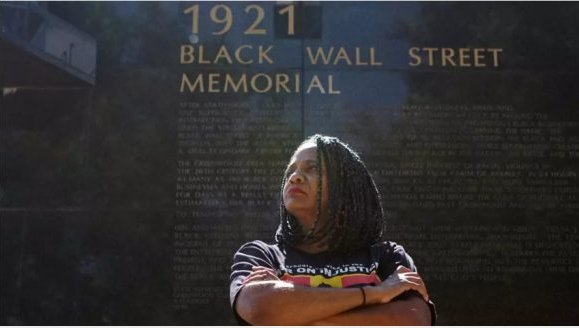
Tulsa Councilwoman Vanessa Hall-Harper poses for a portrait in front of a memorial to the 1921 Greenwood massacre. Tulsa, Oklahoma, USA, June 18, 2020. Lawrence Bryant / Reuters
Subscribe to Blog via Email
| M | T | W | T | F | S | S |
|---|---|---|---|---|---|---|
| 1 | 2 | 3 | 4 | 5 | 6 | 7 |
| 8 | 9 | 10 | 11 | 12 | 13 | 14 |
| 15 | 16 | 17 | 18 | 19 | 20 | 21 |
| 22 | 23 | 24 | 25 | 26 | 27 | 28 |
| 29 | 30 | |||||


You must be logged in to post a comment.